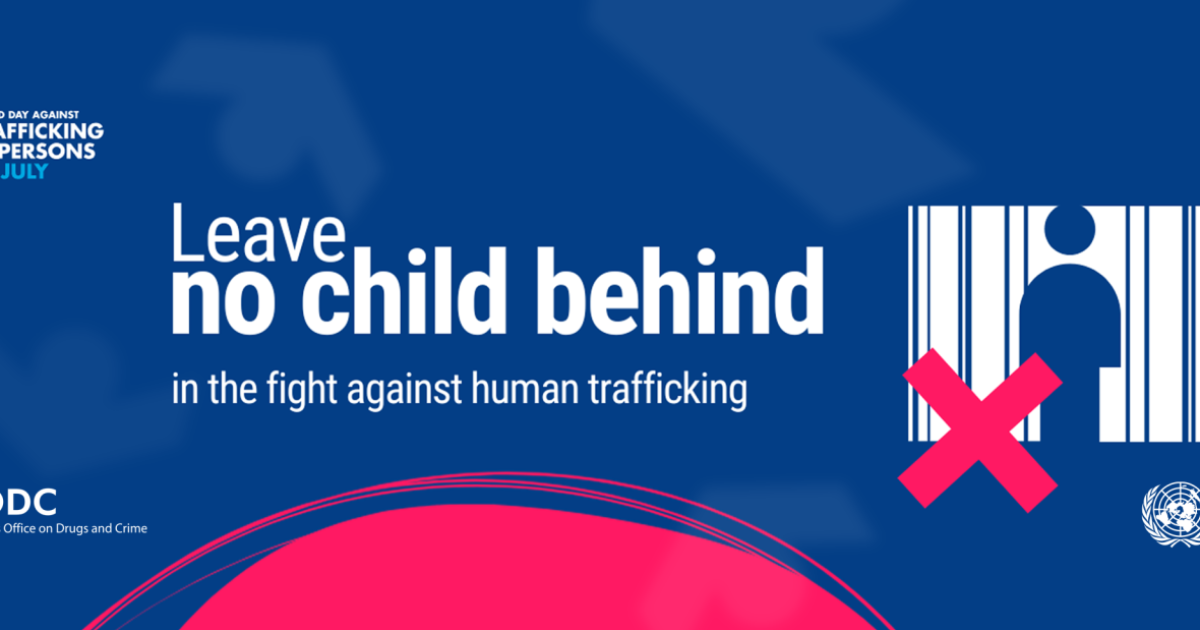Every year, millions of children around the globe fall prey to human trafficking.
To mark World Day against Trafficking in Persons, the United Nations Network on Migration calls on States to intensify their efforts to prevent and combat child trafficking and to provide comprehensive protection and assistance to the children who fall victim to this crime.
Current global crises have led to an unprecedented number of children on the move, whether as migrants, asylum-seekers, refugees or internally displaced persons. These children, particularly when alone, are at heightened risk of human rights violations, violence and exploitation, with devastating impacts on their health.
Over the past 15 years, the proportion of identified child trafficking victims has tripled, with the number of boys among them increasing fivefold. In regions such as Sub-Saharan Africa, North Africa, Latin America and the Caribbean, children account for 60% to 73% of known trafficking victims. Globally, 35% of all detected victims of trafficking are children, with girls representing 18% and boys 17%.
Trafficked children face a far greater risk of suffering violence compared to adults. These victims are exploited for forced labour, criminality, begging, exploitative adoption, forced marriage or sexual abuse.
Under Objective 10 of the Global Compact for Safe, Orderly and Regular Migration, States have committed to bolstering capacities and international cooperation to prevent, combat and eradicate trafficking in persons in the context of international migration. States have also pledged to enhance efforts to identify and protect migrants who have become victims of trafficking, with particular focus on women and children.
To this end, the Network urges States to take measures to strengthen safe and regular migration pathways, including family reunification; include children on the move in child protection systems; avoid criminalizing trafficked children, treating them rather as victims and provide them with specialised assistance, safe shelters and timely appointment of independent and qualified guardians, ensuring that all decisions are made in the best interests of the child; prioritize and protect the health needs of trafficked children; and, where appropriate, ensure rights-based, safe and dignified return and sustainable reintegration for these children in line with international human rights law. Furthermore, action is needed to increase access to decent work for adults and social protection and education for all, reducing those factors which can compel people to migrate in unsafe ways.
Urgent measures are also needed to strengthen accountability and end impunity for child trafficking, including by enhancing criminal justice measures aimed at traffickers and ensuring access to justice for child victims and children at risk of trafficking, without discrimination. States are also urged to undertake additional actions recommended by the Inter-Agency Coordination Group against Trafficking in Persons to prevent and end child trafficking.
Above all, every effort should be made to ensure that children on the move are not separated from their families and that the best interests of the child – whatever their status – are prioritized at all times.
“Too many children are falling prey to human traffickers along migration routes. We must step up global efforts to protect children from exploitation and guarantee them the care, protection, and safety they need while ensuring respect for their human rights.” – Ms Ghada Waly, Executive Director of the UN Office on Drugs and Crime, on behalf of the UN Network on Migration.
The Network stands ready to provide technical support and guidance to all States in preventing, tackling and ending all forms of this horrific phenomenon.
Protecting children from trafficking is an obligation and demands a unified effort from governments, international organizations, stakeholders and communities worldwide. It is an investment in our shared future and safety; it is also what our common humanity demands.
* * *
For more information, please contact:
UN Network on Migration: Florence Kim: [email protected]; +41 79 7480395



